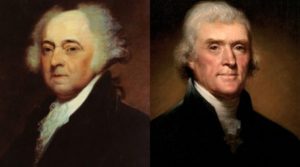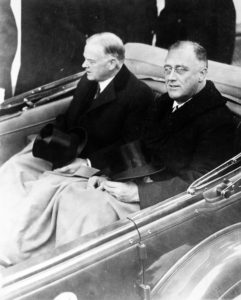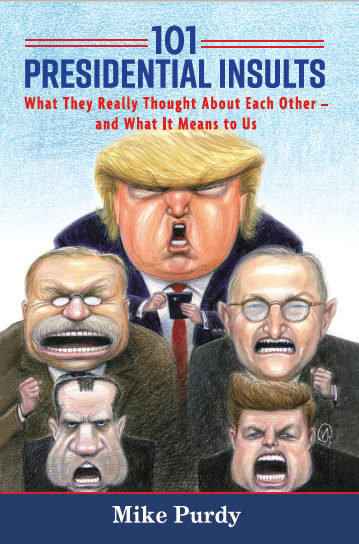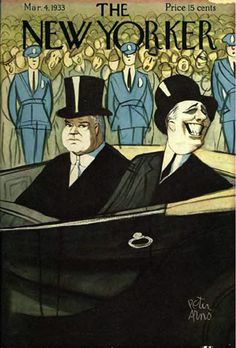One of the hallmarks of our democracy is the peaceful transfer of power from one president to another, reaching back to March 4, 1797 when George Washington turned over the reigns of power to John Adams. And while the inauguration of a new president has always been peaceful, it hasn’t always been pleasant. Here are two such stories.

John Adams and Thomas Jefferson
John Adams and Thomas Jefferson: When John Adams’ vice president, Thomas Jefferson, defeated him in his bid for a second term in the newly constructed Executive Mansion (as the White House was then known), Adams was humiliated and upset. He decided he wanted nothing to do with Jefferson’s inauguration. In fact, he didn’t want to even be there. But rivalry had not always defined their relationship.
- Friendship and Feud: The two men had formed a close friendship and collaboration when they first met in 1775 in Philadelphia to push for independence from Great Britain. That continued as they served together in Europe as diplomats representing the new nation. But by 1796, their friendship had turned into a political feud, with each of them privately denigrating the other.
- Lobbing Insults: Just three months after their inauguration as the embryonic nation’s top two elected officials, Vice President Jefferson privately groused to a French diplomat that President Adams was “distrustful, obstinate, excessively vain, and takes no counsel from anyone.” Weeks later, Adams spewed out his frustration, writing in a private letter that his vice president had “a mind soured, yet seeking for popularity, and eaten to a honeycomb with ambition, yet weak, confused, uninformed, and ignorant.”
- Adams Skips Town: When Jefferson ousted Adams from the presidency in the election of 1800, Adams was forced to pack his bags and vacate the newly constructed Executive Mansion after just a few months. At four o’clock in the morning on March 4, 1801, Jefferson’s inauguration day, the sullen Adams slipped out of the Executive Mansion without fanfare, boarded a public stage and left Washington. The streets were quiet as the president left the capital under the cover of darkness on his journey back home. He wanted nothing to do with the man who had publicly humiliated him by denying him a second term as president, nor in witnessing Jefferson’s inauguration and moment of triumph. Fortunately, Adams’ petulant and immature action did not establish an unhealthy precedent for the new nation.
Herbert Hoover and Franklin Roosevelt: More than a century and a quarter later – at the height of the Great Depression – Herbert Hoover was electorally evicted from the White House by a man who had once been one of his biggest fans. Hoover harbored feelings of humiliation, just like Adams had.
- Boy Wonder: During World War I, Hoover and Roosevelt were good friends, neighbors, and top officials together in the Wilson administration. Roosevelt was an unabashed fan of the ever-competent but dour and charisma-challenged Hoover. He lobbied for Hoover to run for president, declaring in 1920 that “I wish we could make him President of the United States. There could not be a better one.”
- Gibbering Idiot: A dozen years later, after FDR’s runaway election victory over President Hoover, the president-elect paid a visit to Hoover in the White House to discuss transition issues. Hoover was not impressed with his successor, grousing privately that FDR was a “gibbering idiot.”

President Herbert Hoover and President-elect Franklin Roosevelt on FDR’s inauguration day
- Awkward Ride: Unlike John Adams, at least Hoover showed up for FDR’s inauguration, but it wasn’t a comfortable encounter. Hoover dreaded the day. The president-elect’s car pulled up to the White House to pick up the president for the ride down Pennsylvania Avenue to the Capitol where FDR would take the oath of office. Hoover greeted FDR before getting in the car. But there was an awkward tension in the air as the two former friends and colleagues – now bitter rivals – sat in the back seat of an open convertible with their shoulders just inches apart. They barely spoke to each other on the short trip. FDR flashed his famous smile to the crowds lining the street while an unsmiling and petulant Hoover awkwardly endured what he viewed as a very public humiliation. At the conclusion of Roosevelt’s inaugural address, Hoover rose, perfunctorily shook the new president’s hand, and left immediately for the train that would take him to his political exile in New York City. It was the last time they ever saw one another.
The Future: Win or lose, the peaceful transition of power from one president to another remains a deeply embedded and cherished tradition. May it always continue to be so.
Presidential Relationships: These two stories contain a few of the quotes included in my book, 101 Presidential Insults: What They Really Thought About Each Other – and What It Means to Us. The book is available from Amazon, Barnes & Noble, or your local bookstore.


 Facebook
Facebook
 Twitter
Twitter
 LinkedIn
LinkedIn
 YouTube
YouTube
 Pinterest
Pinterest